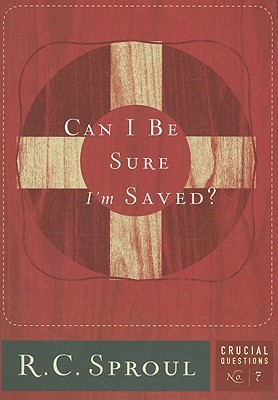First sentence: There is a passage in the New Testament that I believe is one of the most terrifying in the Bible. It comes from the lips of Jesus at the end of the Sermon on the Mount.
This little booklet tackles the controversial subject of assurance of salvation. It seeks to answer the question can a person be sure he/she is saved? It is not a light, inconsequential question. Nor is it a question with fifty--or a hundred--answers all equally right. It is a life-or-death question with eternal consequences.
Before answering the question properly, Sproul points out that it isn't just a Roman Catholic versus Protestant controversy. Within the Protestant community, there are a variety of responses and opinions to the question. He makes a clear distinction between "Protestant" theology and "Reformed" theology. It's a distinction that the average believer may perhaps be oblivious to. The position Sproul takes in the booklet is the Reformed response to the question. Sub-questions tackled are: what is salvation? what is regeneration? what is election?
Sproul asserts that there are four types of people in the world. "Every living person, without exception, can be assigned to one of these categories. The categories are: 1) those who are saved and know it, 2) those who are saved but do not know it, 3) those (like the man I mentioned above) who are unsaved and know it, and 4) those who are unsaved but do not know it." The book examines those categories in detail. Particularly making the distinction between TRUE ASSURANCE and FALSE ASSURANCE. He talks about three 'main' errors of false assurance: universalism, legalism, and various forms of sacerdotalism.
The book is a thought-provoking read. Sproul challenges how we think about evangelism, about how we "do" evangelism. He writes,
When one is immersed in a Christian subculture that puts a great deal of stress on making decisions, responding to altar calls, and praying the sinner’s prayer, it is easy to miss this important point—making a decision to follow Jesus has never converted anyone. This is because it is not a decision that converts a person; it is the power of the Holy Spirit that does so. We get into the kingdom not because we make a decision, walk down an aisle, raise a hand, or sign a card. We get into the kingdom because there is true faith in our hearts. (15)A few pages later, he says:
Actually, one of the most dangerous things we can do as Christians is to determine our theology by our experience, because no one’s experience is normative for the Christian life. We have to determine our theology from the Word of God, not from what we feel. Actually, one of the most dangerous things we can do as Christians is to determine our theology by our experience, because no one’s experience is normative for the Christian life. We have to determine our theology from the Word of God, not from what we feel. (23)
We have so eliminated the last judgment from our theology and expunged any notion of divine punishment or of hell from our thinking (and from the church’s thinking) that it is now widely assumed that all a person must do to get to heaven is to die. In fact, the most powerful means of grace for sanctification in our culture is to die, because a sin-blistered sinner is automatically transformed between the morgue and the cemetery, so that when the funeral service is held, the person is presented as a paragon of virtue. His sins seem to have been removed by his death. This is very dangerous business, because the Scriptures warn us that it is appointed for every person once to die, then to face judgment (Heb. 9:27). (32)
© Becky Laney of Operation Actually Read Bible


Wow, this looks like a good one!
ReplyDelete